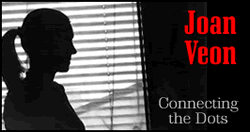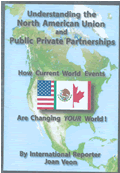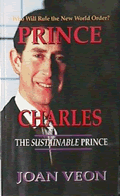Other
Veon
Articles:
US Leaders Highlight World Economic Forum Agenda
Global Taxation And Tax Harmonization
Does The
Global Economy Need a Global Currency?
TREASON IN THE CONGRESS
By
Joan Veon
June 20, 2007
NewsWithViews.com
Recently The Washington Post ran an article entitled, �A Senate Debate with a British Accent.� In it they explained that Democratic Senator Chuck Schumer, who appeared to be �playing a British parliamentarian [Oliver Cromwell], had come to seek a �vote of no confidence� in Attorney General Alberto Gonzales�and thereby deal a blow to the imperial reign of President Bush the Second.� When it was told to President Bush who was traveling in Bulgaria, he said, �They can try to have their votes of no confidence, but it�s not going to determine---who serves in my government.� The article mused, �Only in America would the president turn himself into a king on the very same day that the Senate decides to become a parliament.� Let�s talk about this for a moment. Although Senator Orrin Hatch explained �This is not a parliament� and went on to explain our system of government, Schumer defended his proposal by saying, �It is a rare measure, I know.� Schumer had 52 senators join him in his no confidence vote, leaving it seven of the 60 votes needed. For now, a rather thin margin of 11.5% kept our government from moving towards a parliamentary form of government. In order to consider what is in the making, we need to look at external and internal forces.
The external forces are those who want to merge the U.S. with England. Would it be unreasonable to consider the idea that Britain would do anything to get America back? Would Schumer be knighted by the Queen for his service to Britain should a no confidence vote set precedence in our Congress? Furthermore, we should consider that one of our presidential hopefuls, Rudy Giuliani, has accepted a knighthood from the Queen. Let us also mention the knighthoods bestowed upon Presidents Reagan and Bush I who were knighted after leaving office. While we are at it, we should also mention the fact that many of our presidents have direct ties to British aristocracy and royalty.
Presidents that are descended from Willem III the Good, Count of Holland and Hainault (1286-1337) and John of Gaunt, Duke of Lancaster are George Washington, Thomas Jefferson, John Quincy Adams, Theodore Roosevelt, Franklin D. Roosevelt and Nelson Aldrich Rockefeller. Presidents descended from Hendrik, Duke of Brabant (1207-1248) to Henry the III, earl of Lancaster are William Henry Harrison and Benjamin Harrison along with both Bush presidents. It should be noted that the Bush presidents are also related to Queen Elizabeth II. Those related to Henry II of England (133-1189) are Presidents Ulysses S. Grant, Grover Cleveland and Gerald Ford. President Ford had the most royal blood as his descendants also included Kings John and Henry III of England, Henry of Lancaster and Mary Beaumont. Other presidents related to minor royalty included: James Madison, James Monroe, Rutherford B. Hayes, and John Calvin Coolidge.
[Advertisement: See Joan Veon's new DVD "Understanding the North American Union & Public Private Paernerships"]
The goal to move America into global government is not new. It was the goal of many British aristocrats, specifically Cecil Rhodes and industrialist Andrew Carnegie, along with the Pilgrim Society.
Cecil Rhodes had a dream of making the world British because in his opinion, �they are the finest race in the world.� According to Georgetown professor, Dr. Carroll Quigley who wrote The Anglo-American Establishment, �Rhodes in five previous wills, left his fortune to form a secret society which was to devote itself to the preservation and expansion of the British Empire. This society [now known as the Royal Institute for International Affairs-RIIA] has been known at various times as Milner�s Kindergarten, as the Round Table Group, as the Rhodes crowd, as The Times Crowd, as the All Souls Group, and as the Cliveden set.� The American branch of the RIIA is the Council on Foreign Relations, of which many in our government are members. Quigley explained that Rhodes was the leader during his lifetime along with William T. Stead, Lord Esher known as Reginald Balliol Brett (friend and confident of Queen Victoria and the most influential adviser of King Edward VII and King George V), and Alfred Milner. Quigley describes some of their achievements,
It plotted the Jameson Raid of 1895; it caused the Boer War of 1899-1902; it set up and controls the Rhodes Trust; it created the Union of South Africa in 1906-1910; it has been the most powerful single influence in All Souls, Balliol, and New Colleges at Oxford for more than a generation; it has controlled The Times for more than 50 years, with the exception of 1919-1922; it publicized the idea of and the name �British Commonwealth of Nations�; it was the chief influence in Lloyd George�s war administration in 1917-1919; it had a great deal to do with the formation and management of the League of Nations [now United Nations] and of the system of mandates; it founded the Royal Institute of International Affairs in 1919 and still controls it; it controlled and still controls, to a very considerable extent, the sources and the writing of the history of British Imperial and foreign policy since the Boer War (page 5).
Those who were key insiders with Rhodes included Lord Robert Cecil, Lionel Curtis, Lord Rothschild, and others. It was they who determined that an organization like the League of Nations�now the United Nations was a way of bringing the world back under British rule.
The dream of Rhodes was also shared by Andrew Carnegie, a Scottish immigrant who made good in America when he invested in railroads where he made his first fortune with the rest in steel. Carnegie Steel went on to become U.S. Steel and was purchased by J.P. Morgan. Carnegie used much of his wealth philanthropically as he endowed the Carnegie Library system throughout the U.S., and a number of foundations whose goal it was to merge the U.S. with Britain. He became an internationalist after the Edward VII spent a weekend at his castle in Scotland. In his book, Triumphant Democracy, Carnegie wrote,
Let men say what they will, I say that as surely as the sun in the heavens once shone upon Britain and America united, so surely is it one morning to rise, to shine upon, to greet again the reunited states�the British-American Union.
In an article written by him that appeared in the London Express on October 14, 1094, he again heralded the union of Britain and America,
It need not be feared that force will ever be used or required to accomplish this union. It will come�must come�in the natural order of things. Political as well as material bodies obey the law of gravitation.
Carnegie endowed the Carnegie Endowment for International Peace-CEIP in 1910 with $10M. While its mandate says it is dedicated to advancing cooperation between nations and promoting active international engagement by the United States, it has been a major player creating global sea-changes to help set in place a world governmental structure. CEIP has published, convened and created new institutions and international networks globally. In short, they are a major change-agent and are doing everything they can to destroy national sovereignty to facilitate world government to match the benefactors beliefs, just like the RIIA.
Past presidents include Elihu Root, Nicholas Murray Butler, Alger Hiss, and currently Jessica T. Mathews. In 1914, the Endowment helped create The Hague Academy of International Law which is located in the Peace Palace in The Hague, Netherlands. If you are going to destroy national sovereignty and national law, you then need to increase the power and position of international law.
In 1902, shortly after the death of Cecil Rhodes, the Pilgrim Society was organized in London as an Anglo-American club of English and Americans. A year later, an American branch was founded at the Waldorf-Astoria Hotel in New York. Its constitution states in part,
The object of the society shall be the promotion of the sentiment of brotherhood among the nations, especially the cultivation of good fellowship between citizens of the United States and its dependencies and subject of the British Empire. The membership shall be limited to 900.
The goal is the reunion of America with Britain to find those who were more loyal to England than America and who would work towards that end. At their highly secret meetings�far more secret than the Bildebergers�they toast the reigning British monarch. Their members are found in the highest levels of our government, military, judicial, scientific, and educational organizations as well as religious bodies. Past members included J. P. Morgan, Elihu Root, Thomas W. Lamont, John D. Rockefeller, Percy Rockefeller, Ogden Mills Reid, Otto Kahn, Andrew Mellon, W.B. Whitney, Cornelius Vanderbilt, Vincent Astor, Paul M. Warburg and Mortimer I. Schiff. A number of these same members were responsible for the passage of the Federal Reserve Act, America�s central bank. Not much is known about current members since it is a very secret society. Disraeli once said, �Read no history, only biography, for that is life without theory.� The only way to know who is a member and believer in British rule is by studying the biographies of its members.
According to documents and statements entered into the 1940 Congressional Record by Congressman J. Thorkelson of Montana, he provides a transcript of the remarks of British Pilgrim member Lord Charles Beresford to the American Pilgrim branch,
Congratulations on brilliant success of efforts to bring together two great English-speaking nations. Now gentlemen, that is the object, and the sole object that I know of, that this flourishing society has, the sole reason for its existence: to promote good will, good fellowship, abiding friendship and everlasting peace between the United States and Great Britain. And, for one, I have no fear of failure.
Beresford went on to write of the goal to united the US and Britain that �our great-grandchildren celebrating in 2013 the second centenary of the Pilgrims, will have cause to bless their fathers that they founded this society and kept the world on the right track.�
So how were these Pilgrims going to get the U.S. and U.K. to hook up? It was Columbian University president Nicholas Murray Butler, who later became president of the Carnegie Endowment for International Peace, that supported the idea that international peace could be established if the U.S. entered WWI on the side of Britain. Sir Uncle Sam, Knight of the British Empire, said in a 1917 speech,
In these days of national and international confusion and conflict there is one issue on which the American people are substantially in agreement�We do not war. Today, denuded of all propaganda, there is only one fundamental issue behind all the conflict in Europe and Asia�the survival of the British Empire. It seems to me that the answer to the above question is definite and indisputable�Britain cannot win a major war in Europe and Asia without the active assistance of the most powerful of all nations, the United States. In the present crisis the only active allies of Britain are, so far, the British Empire units and France. If the conflict should spread into another world war, Britain cannot again count on her former combination of allies. Therefore, the most powerful ally of all, the United States must be kept in line by Britain against eventualities.
The U.S. did come in on the side of Britain not only for World War I but for World War II and the Falklands. Now Britain has joined the U.S. in the �war against terrorism.�
Our union is taking on many interesting related dimensions. In the June 15, 2007 Financial Times, they reported Bush is going to back a treaty to �tackle one of the most contentious issues in relations between the two countries by allowing Britain to buy defense products from American companies without having to obtain export licenses. [T]he treaty would represent a victory for UK prime minister who has lobbied George W. Bush over this long-standing disagreement between the two.� Currently only Canada has a waiver.
Lastly in taking a look at the relationship between the US and UK, we need to consider the Commonwealth. It was the Rhodes funded Royal Institute for International Affairs that started to propagate the idea of a British Commonwealth of Nations. According to Nicholas Murray Butler, there was a movement going on to bring into existence a British Commonwealth of Nations which was, at the time of its inception, a new form of political organization to take the place of the old British Empire. According to Wikipedia.org, the definition of Commonwealth is �The Commonwealth of Nations is a voluntary association of independent sovereign states, mostly formed by the United Kingdom and its former colonies� and are countries that �acknowledge the British monarch as head of state are known as Commonwealth Realms� while all members recognize Queen Elizabeth II as Head of the Commonwealth.�
The Statute of Westminster 1931 is an Act of the Parliament of the United Kingdom which established legislative equality between the self-governing dominions of the British Empire and the UK. It became domestic law within each of the other commonwealth countries as it was adopted by their parliament.
According to Butler, the Statute of Westminster provides �a new form of federal relationship, not a federal relationship such as exists between our own States and the Federal Government, but a federal relationship which consists in loyalty and devotion to a person who is the symbol of unity; but the legislation power is as multiform as the Dominions. Butler was in on the original discussions in the early 1920s to bring the idea of a Commonwealth of Nations into being.
Britain started to form the Commonwealth between 1946 and 1989. During those years, Britain gave �independence� to 41 of its colonies. Interestingly enough, every time one of their former colonies was given independence, they also gained a vote at the United Nations and at all of the other international bodies they are members of.
Internally there is much to discuss as well. First, there is no real philosophic difference between the republicans and democrats, both are working for �interdependence,� globalization or world government. Therefore, they are in effect the same party. There is no real opposing party.
Secondly, the presidents have been busy by-passing Congress by using Executive Orders. Much could be said on this. On May 10 it was reported by The Washington Post that Bush has �issued a formal national security directive (known as National Security Presidential Directive 51 and Homeland Security Presidential Directive 20) ordering agencies to prepare contingency plans for a surprise, �decapitating� attack on the federal government and assigned responsibility for coordinating such plans to the White House. The Post goes on to say, �Other former Bush administration officials said the directive formalizes a shift of authority away from the Department of Homeland Security to the White House.� It was President Reagan who gave responsibility for coordinating, implementing and exercises emergency plans to the Federal Emergency Management Agency. If we are going to be changed to a parliamentarian form of government, then the power and position of the president must change and it appears Bush is ready, willing and able to make it happen!
In light of the above, let us now address the Free Trade Areas of the Americas which will include the North American Free Trade Agreement also known as the North American Union.
Canada is a member of the Commonwealth which recognizes the queen as head. How do you move the U.S. with our Constitutional form of government in to a free trade zone with 13 other Commonwealth members? Let me restate that. When the U.S. is moved into the Free Trade Areas of the Americas which is the EU equivalent for our hemisphere, how does America keep its sovereignty when we will be OUTVOTED by 13 Commonwealth members?
|
Subscribe to the NewsWithViews Daily News Alerts! |
In
summary, why would Senator Schumer want a no confidence vote in light
of America's governmental structure that does not need it? Is Schumer
a Pilgrim or a Boy Scout? There is big power and big money behind
the goal to unite America with Britain. Freedom, when it is gone,
is gone. At every turn, it appears Americans are nothing but serfs!
In light of the above, Schumer and the other 52 should be hanged for
treason, Rudy Giuliani should renounce his knighthood, Bush I should
renounce his knighthood, and Bush II should be brought into alignment
with the Constitution.
� 2007 Joan Veon - All Rights Reserved
Sign Up For Free E-Mail Alerts
E-Mails
are used strictly for NWVs alerts, not for sale
 Order
Joan Veon's book;
Order
Joan Veon's book;
"The
United Nations'
Global Straitjacket"
Joan Veon is a businesswoman and international reporter, having covered 75 Global meetings around the world in the last ten years. Please visit her website: www.womensgroup.org. To get a copy of her WTO report, send $10.00 to The Women's International Media Group, Inc. P. O. Box 77, Middletown, MD 21769. For an information packet, please call 301-371-0541
E-Mail: jveon@adelphia.net
The goal to move America into global government is not new. It was the goal of many British aristocrats, specifically Cecil Rhodes and industrialist Andrew Carnegie, along with the Pilgrim Society.













